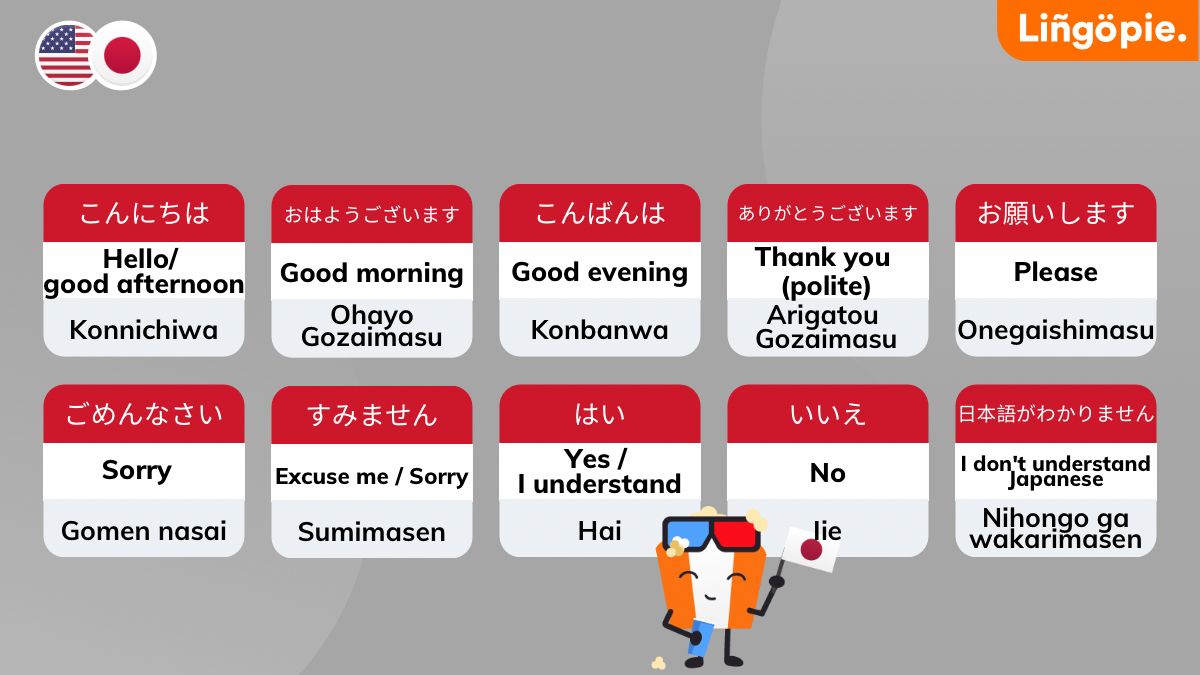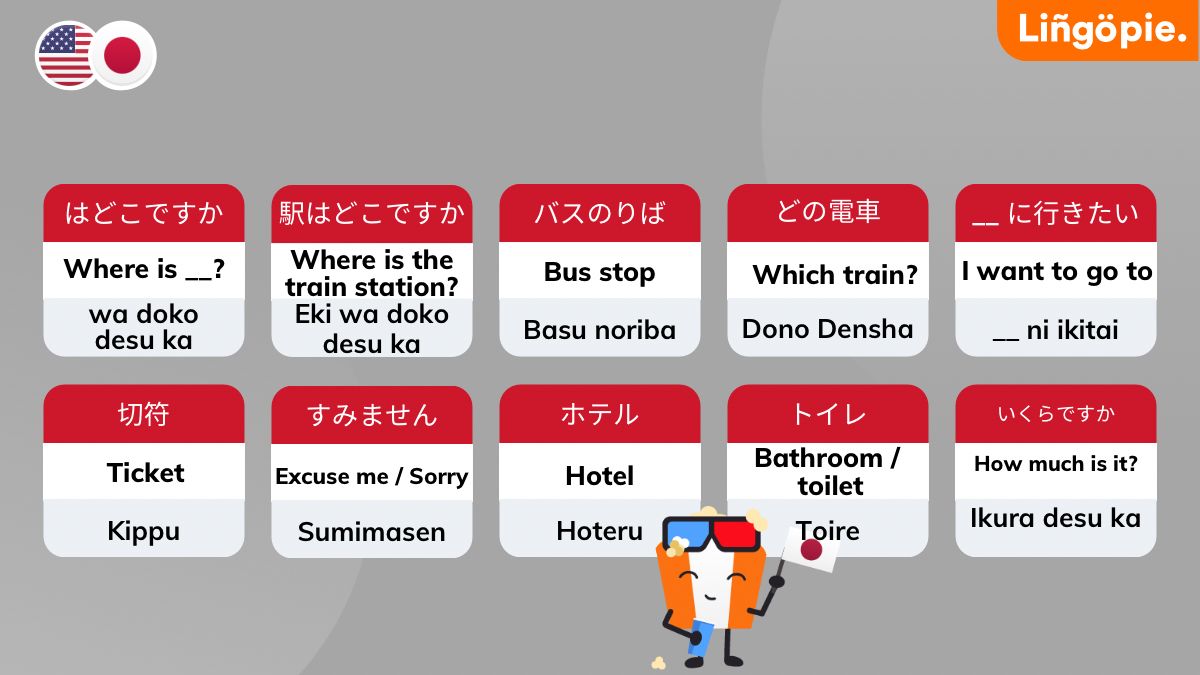Most people assume they'll get by with English in Japan, but here's the reality: fewer than 30% of Japanese people speak English at any level. With less than 8% speaking it fluently, knowing how to say thank you in Japanese or ask where the bathroom is can literally make or break your trip.
In this post, we'll cover 50+ essential Japanese phrases that'll help you navigate restaurants, train stations, and shops while showing respect for Japanese culture. Plus, we'll share pronunciation tips to make you sound more natural and actually learn Japanese the right way!
- How To Say Good Luck In Japanese [12+ Easy Ways]
- 10 Best Movies & Shows to Learn Japanese on Netflix
- The Cheat Code to Learn Japanese With Movies

Can You Survive in Japan Without Speaking Japanese?
Technically, yes but your experience will be significantly limited. Recent data shows that only 15-28% of Japanese people speak English at any conversational level, with less than 2% speaking it fluently. Tokyo scores highest for English proficiency with 496 out of 800 points, but even that's considered "low proficiency" on international scales.
Here's what you can realistically expect:
- Major tourist areas (Tokyo, Kyoto, Osaka) have bilingual signs and some English-speaking staff
- Hotels and popular restaurants often have English menus and basic English speakers
- Train stations in big cities display English alongside Japanese
- Google Translate with camera function works well for signs and menus
- Rural areas and local establishments have virtually no English support
- Emergency situations become genuinely challenging without Japanese phrases
Your survival depends heavily on where you go and what you need. Shopping for souvenirs in Shibuya? You'll manage. Dealing with a medical emergency in rural Kyushu? You'll desperately wish you knew basic Japanese. Even in Tokyo, many locals who know some English are often too nervous to use it because they're afraid of making mistakes and potentially embarrassing themselves.
Common Japanese Phrases For Tourists
When learning Japanese, it’s helpful to familiarize yourself with high-frequency Japanese phrases. These expressions and simple Japanese greetings can help you with everyday social situations, communicate politely, and express yourself.
- こんにちは (konnichiwa) - Hello/Good afternoon
- おはようございます (ohayou gozaimasu) - Good morning
- こんばんは (konbanwa) - Good evening
- さようなら (sayounara) - Goodbye
- ありがとうございます (arigatou gozaimasu) - Thank you
- すみません (sumimasen) - Excuse me/Sorry
- お願いします (onegaishimasu) - Please
- はい (hai) - Yes
- いいえ (iie) - No
- トイレはどこですか (toire wa doko desu ka) - Where is the bathroom?
- 〜はどこですか (~wa doko desu ka) - Where is ~?
- いくらですか (ikura desu ka) - How much is it?
- 英語を話せますか (eigo wo hanasemasu ka) - Do you speak English?
- 大丈夫です (daijoubu desu) - It's okay/I'm fine
- ごめんなさい (gomen nasai) - I'm sorry
- 分かりません (wakarimasen) - I don't understand
- 助けてください (tasukete kudasai) - Please help
- チェックをお願いします (chekku wo onegaishimasu) - Can I have the check, please?
- これをください (kore wo kudasai) - This, please
How To Order Food And Drinks In Japanese

When you enter a Japanese restaurant, the staff will greet you with いらっしゃいませ or irasshaimase (welcome). They'll then ask 何名様ですか
or nanmei-sama desu ka (how many people?). You can simply hold up fingers to show your group size or say the number.
Once you're seated and want to ask for an English menu, you can say 英語のメニューはありますか or eigo no menu arimasu ka (do you have an English menu?). Aside from these common Japanese phrases, you can also use the ones we rounded up below.
- すみません (sumimasen) - Excuse me (to get staff's attention)
- これをお願いします (kore wo onegaishimasu) - This, please (while pointing to the menu)
- 〜をお願いします (~wo onegaishimasu) - I'd like [item], please (e.g., ラーメンをお願いします for "Ramen, please")
- 〜をください (~wo kudasai) - Please give me [item] (e.g., ビールをください for "Beer, please")
- オススメは何ですか (osusume wa nan desu ka) - What do you recommend?
- メニューをお願いします (menyuu wo onegaishimasu) - Menu, please
- 二人です (futari desu) - There are two of us/for two people
- お冷をお願いします (ohiya wo onegaishimasu) - Cold water, please
- お代わりをお願いします (okawari wo onegaishimasu) - Another/refill, please
- 会計をお願いします (kaikei wo onegaishimasu) - Check, please
- 大丈夫です (daijoubu desu) - No thank you/It's okay
- もう一つください (mou hitotsu kudasai) - One more, please
- 少々お待ちください (shoushou omachi kudasai) - Please wait a moment
- かんぱい (kanpai) - Cheers
- いただきます (itadakimasu) - A Japanese expression of gratitude before eating

Common Japanese Phrases For Shopping
When browsing Japanese stores, staff will often approach with 何かお探しですか? or nanika osagashi desu ka? (are you looking for something?). If you're just browsing, respond with いいえ、見ているだけです or iie, mite iru dake desu (no, I'm just looking). For something specific, you can also say 〜を探しています or ~ wo sagashite imasu" (I am looking for [item]).
- これ、いくらですか (kore, ikura desu ka) - How much is this?
- 見てもいいですか (mite mo ii desu ka) - May I see this?
- 試着できますか (shichaku dekimasu ka) - Can I try this on? (clothes)
- 他の色はありますか (hoka no iro wa arimasu ka) - Do you have another color?
- もう少し安くなりますか (mou sukoshi yasuku narimasu ka) - Can you make it a bit cheaper?
- 袋は要りますか (fukuro wa irimasu ka) - Do you need a bag?
- カードで払えますか (kaado de haraemasu ka) - Can I pay by card?
- ポイントカードはお持ちですか (pointo kaado wa omochi desu ka) - Do you have a point card?
- 領収書をください (ryoushuusho wo kudasai) - Please give me a receipt

How To Ask For Directions In Japanese
Getting directions in Japan involves two crucial parts: knowing how to ask politely and understanding the response you receive. Many travelers can ask where something is but struggle when locals give detailed directions in rapid Japanese. Here's how to handle both sides of the conversation.
How to Ask for Directions
- すみません、〜はどこですか? (sumimasen, ~wa doko desu ka?) - Excuse me, where is ~?
- ちょっといいですか? (chotto ii desu ka?) - May I ask you something?
- 〜へはどうやって行きますか? (~e wa dou yatte ikimasu ka?) - How do I get to ~?
- 助けてくれますか? (tasukete kuremasu ka?) - Can you help me?
Understanding the Directions You'll Receive
- まっすぐ行ってください (massugu itte kudasai) - Please go straight
- 右に曲がってください (migi ni magatte kudasai) - Please turn right
- 左に曲がってください (hidari ni magatte kudasai) - Please turn left
- 交差点で左に曲がってください (kousaten de hidari ni magatte kudasai) - Turn left at the intersection
- 次の角を右に曲がってください (tsugi no kado wo migi ni magatte kudasai) - Turn right at the next corner
- 駅はあそこです (eki wa asoko desu) - The station is over there
- まっすぐ (massugu) - straight
- 右 (migi) - right
- 左 (hidari) - left
- 交差点 (kousaten) - intersection
- 角 (kado) - corner
- 次 (tsugi) - next
- あそこ (asoko) - over there
- ここ (koko) - here
- そこ (soko) - there
Transportation-Related Phrases In Japanese

- ___wa doko desu ka (はどこですか) – Where is __?
- Eki (駅) - Train station
eg. Eki wa doko desu ka (駅はどこですか) - Where is the train station? - Basu noriba (バスのりば) - Bus stop. It’s worth noting that "noriba" (乗り場) means "boarding place" or "stop."
- Dono Densha (どの電車)/ Dono basu (どのバス) – Which train?/ Which bus?
- (Tōkyō) ni ikitai ([東京) に行きたい) – I want to go to (Tokyo)
- Kippu (切符) – Ticket
- Katamichi kippu (片道切符)/ Kaeri no kippu (帰りの切符) - One-way ticket/ return ticket
- Hoteru (ホテル) - hotel
- Toire ( = トイレ) - Bathroom / toilet
- Ikura desu ka (いくらですか) - How much is it?
Japanese Common Phrases For Hotels
Staying at a Japanese hotel involves specific interactions from arrival to departure, and knowing the right phrases helps everything go smoothly. Hotel staff typically speak some English, but using polite Japanese shows respect and often results in even better service.
Check-In and Reservations
- 予約をしています (yoyaku wo shite imasu) - I have a reservation
- チェックインをお願いします (chekku in wo onegaishimasu) - Check-in, please
- 部屋の鍵をください (heya no kagi wo kudasai) - Please give me the room key
- WiFiのパスワードを教えてください (WiFi no pasuwaado wo oshiete kudasai) - Please tell me the WiFi password
During Your Stay
- タオルをお願いします (taoru wo onegaishimasu) - Towels, please
- 部屋を掃除してください (heya wo souji shite kudasai) - Please clean the room
- お湯が出ません (oyu ga demasen) - Hot water isn't coming out
- エアコンが動きません (eakon ga ugokimasen) - The air conditioner isn't working
- もう一つ枕をください (mou hitotsu makura wo kudasai) - One more pillow, please
Services and Requests
- 朝食は何時からですか (choushoku wa nanji kara desu ka) - What time does breakfast start?
- コインランドリーはどこですか (koin randorii wa doko desu ka) - Where is the coin laundry?
- 荷物を預けられますか (nimotsu wo azukeraremasu ka) - Can I leave my luggage?
Check-Out
- チェックアウトをお願いします (chekku auto wo onegaishimasu) - Check-out, please
- 領収書をください (ryoushuusho wo kudasai) - Please give me a receipt
- ありがとうございました (arigatou gozaimashita) - Thank you very much (past tense for completed service)
Time-Related Phrases In Japanese
Whether you're inquiring about the current time, referring to specific times of the day, or discussing dates, these Japanese time phrases will prove invaluable. Let's explore 10 essential time-related words and expressions in Japanese:
| Japanese | Romaji | English | Notes |
|---|---|---|---|
| 今何時ですか | Ima Nanji Desu ka? | What time is it now? | "Nanji" (何時) means "what time." |
| 朝 | Asa | Morning | |
| 今日 | Kyou | Today | |
| 明日 | Ashita | Tomorrow | |
| 何時に? | Nanji ni? | At what time? | |
| 午後 | Gogo | Afternoon | |
| 夜 | Yoru | Night/Evening | |
| 昨日 | Kinou | Yesterday | |
| いつでも | Itsudemo | Anytime/Whenever | |
| 時間がありません | Jikan ga arimasen | I don't have time. | This phrase is formal. A more casual version is 時間がない (Jikan ga nai). |
How To Learn Common Japanese Phrases Naturally

Most Japanese learners struggle with phrases that sound robotic or out of place because they memorized them from lists without understanding real usage. Lingopie solves this by teaching phrases through authentic Japanese TV shows, movies, and documentaries.
The idea is that the more you watch, the more you'll learn how Japanese people really talk, including tone, timing, and context that make phrases sound natural. With Lingopie’s interactive dual subtitles, you can also click any phrase to instantly see its meaning and pronunciation.
Ready To Speak Japanese?
These 50+ phrases will get you through your Japan trip, but what if you could actually understand what people are saying back to you? Imagine watching a Japanese drama and catching jokes, cultural references, and subtle emotional nuances that no phrasebook could ever teach you.
With Lingopie, you're not drilling vocabulary lists. Instead, you're binge-watching authentic Japanese content while subtly absorbing the language. Curious how much Japanese you could pick up from just one episode of your favorite show? There's only one way to find out.
FAQs About Japanese Phrases for Tourists
What are some helpful tourist phrases in Japan?
Essential Japanese phrases for tourists include:
- Konnichiwa (こんにちは) – Hello/Good afternoon.
- Sumimasen (すみません) – Excuse me/Sorry.
- Arigatou Gozaimasu (ありがとうございます) – Thank you.
- Eki wa doko desu ka? (駅はどこですか) – Where is the train station?
- Toire wa doko desu ka? (トイレはどこですか) – Where is the bathroom?
For more practical phrases, try Lingopie, a platform for learning Japanese through TV shows and movies.
How to speak Japanese for tourists?
Tourists can start with basic greetings like Ohayou Gozaimasu (おはようございます) – Good morning, and polite requests like Onegaishimasu (お願いします) – Please. Questions like Ikura desu ka? (いくらですか) – How much is it? are also useful. Practice with tools like Lingopie to improve pronunciation and fluency.
What do Japanese people say before going out?
Before leaving, Japanese people say Ittekimasu (行ってきます) – "I’m leaving." The response is Itterasshai (行ってらっしゃい) – "Take care." These phrases reflect Japanese politeness and cultural values. Learn more everyday expressions with Lingopie.
Are Japanese polite to tourists?
Yes, Japanese people are known for their politeness and helpfulness toward tourists. They appreciate visitors who try to speak Japanese, even with basic phrases. Politeness is a key part of Japanese culture, so expect friendly greetings and assistance.
What is the slogan of Japan Tourism?
Japan Tourism’s slogan is "Endless Discovery", highlighting the country’s diverse attractions. From Tokyo’s bustling streets to Kyoto’s serene temples, Japan offers something for everyone. Learning a few Japanese phrases can enhance your travel experience.








![12 Best Japanese TV Shows To Learn Japanese [2026]](/blog/content/images/size/w300/2023/09/C-pia-de-imgs-blog---Spanish-1--10-.png)
![How To Write The Japanese Kanji For Love [+ FREE Printable]](/blog/content/images/size/w300/2025/03/Japanese-Kanji-for-Love-1.jpg)
